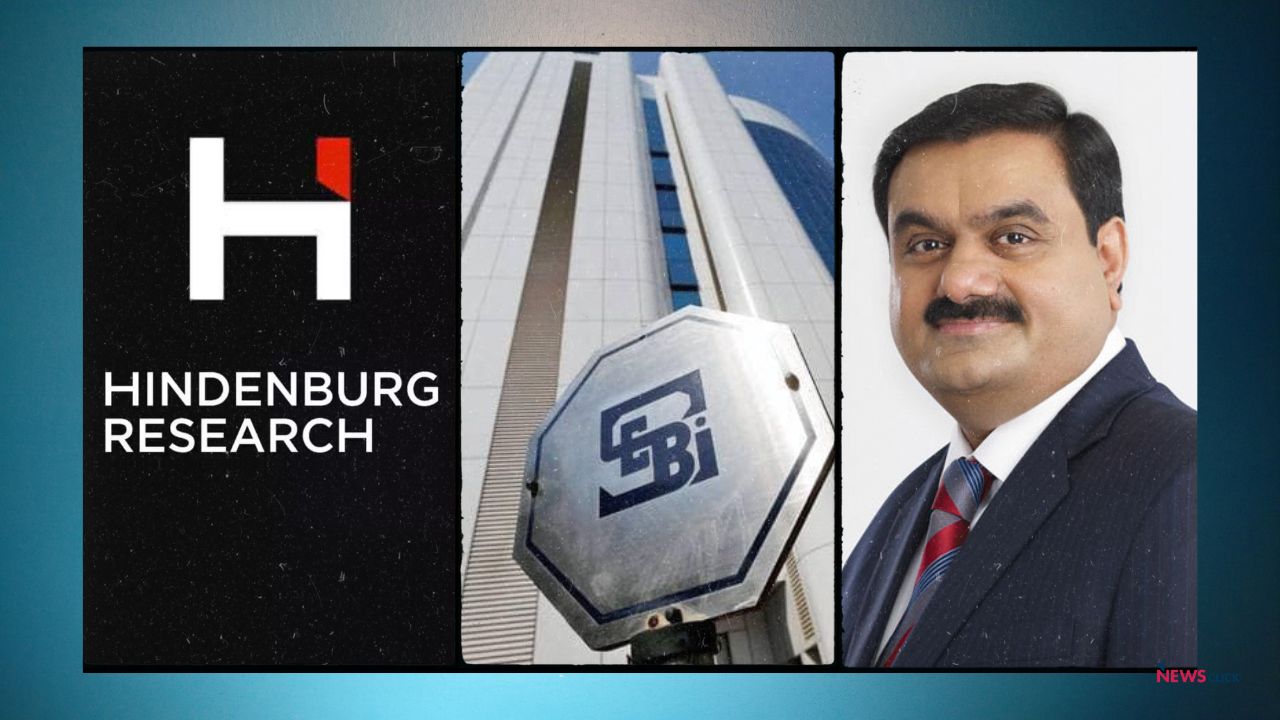How Easy It Is In India For A Startup (Byju’s) Or A Leading Conglomerate (Adani Group) To Avoid Sleeping Market Regulaters (SEBI) And Siphon Off Funds To Offshore Accounts, Thus Cheating Investors, Shareholders And Millions Of People In This Country?
In India, where the business environment is as diverse as it is dynamic, it's both concerning and eye-opening to witness instances of financial deception, as in the cases of Byju's and the Adani Group. As per new reports, these incidents shed light on a disconcerting aspect of India's corporate world, where it appears all too easy for both startups and conglomerates to siphon off money and deceive investors, regulators, and shareholders. In the recent allegations involving Byju's and the Camshaft Capital Fund, we're confronted with yet another unsettling chapter in India's startup arena. Similarly, the Adani Group, a juggernaut in the Indian corporate sphere, grapples with allegations of moving money through a complex web of subsidiaries. A former Adani contractor, Ajay Kumar Agarwal, has stepped forward, claiming firsthand knowledge of these money transfers. Furthermore, the recent revelation that the Securities and Exchange Board of India (SEBI) may have concealed a 2014 alert by the Directorate of Revenue Intelligence (DRI) regarding Adani Group's possible fund diversion and stock market manipulation adds another layer of complexity. SEBI's ongoing investigation into these allegations raises questions about regulatory oversight and transparency.

Financial Deception and Corporate Secrecy in India
In India, where the allure of entrepreneurship and business ventures is ever-expanding, there exist opportunities for both renowned startups and established conglomerates to engage in financial deception, potentially harming investors, regulators, and shareholders.
Two distinct cases which have shaken up the startup world and the well-established conglomerates in India, Byju’s and the Adani Group, have been garnering headlines with new revelations coming in each day.

Byju’s Latest Revelations
Byju’s, one of India’s leading tech companies, stands accused of concealing a substantial $533 million within an obscure hedge fund that, at one point, claimed its primary business address was an IHOP pancake restaurant in Miami.
These allegations have been made by lenders who are seeking to recover this substantial sum; Byju’s initiated this financial operation by transferring over half a billion dollars to Camshaft Capital Fund, an investment firm founded by William C. Morton, a relatively young individual with no apparent formal training in investment.
Adding intrigue to the situation, luxury cars, including a 2023 Ferrari Roma, a 2020 Lamborghini Huracán EVO, and a 2014 Rolls-Royce Wraith, were registered in Morton’s name following the fund transfer.
These allegations have surfaced amidst an increasingly public battle between Byju’s and lenders claiming that the $533 million is collateral for a $1.2 billion loan.
Both sides have been trading accusations regarding the loan, with lenders asserting it is in default while Byju’s accuses the lenders of employing predatory tactics.
The former argue that Byju’s has gone to great lengths to conceal the whereabouts of the $533 million to hinder and delay creditors, as asserted in Miami-Dade County court filings.
Byju’s, once hailed as India’s most valuable startup, is now striving to reach an agreement with creditors and in a surprising move, it recently proposed to buy back the loan within six months.
To facilitate this repayment, Byju’s is exploring discussing selling some of its overseas assets to private equity and strategic investors; however, Byju’s maintains that it is not a party to the Florida court proceedings and has not yet received copies of the lawsuit.
The agent for the creditors, Glas Trust, has not informed Camshaft about the lawsuit, according to statements from the fund’s lawyers, and Camshaft vehemently denies the allegations made in Glas Trust Company’s court filing.

A Pancake Restaurant?
Interestingly, Byju’s chose to allocate funds to Camshaft, even though this hedge fund appears to cater to smaller clients, with a minimum threshold of as little as $50,000—a considerably low figure for a hedge fund, as mentioned in the lenders’ court filing.
In a Securities and Exchange Commission filing from 2020, Camshaft listed its primary business address as 285 NW 42nd Ave. This location, however, diverges from the typical corporate office, as it is currently occupied by an IHOP diner in Miami’s Little Havana district, surrounded by a drive-through car wash and a strip mall hosting a massage parlor and a sandwich shop.
This seemingly unusual choice of an IHOP address for a hedge fund raises questions about the transparency and legitimacy of such financial transactions.
One might wonder how a bustling pancake restaurant could serve as the principal place of business for a hedge fund handling hundreds of millions of dollars.
Employees at the IHOP expressed surprise when questioned about the hedge fund, stating that they had never heard of Morton, Camshaft Capital Fund, or Byju’s.
In a separate lawsuit filed by Camshaft in Miami in June, the hedge fund asserted that its primary business location is in the Virgin Islands.
The Story Of The Missing Cash
The heart of the lenders’ actions revolves around the missing cash; the lenders’ agent, Glas Trust, achieved an initial victory by gaining control of the Byju’s unit responsible for issuing the debt.
However, by that point, the cash had mysteriously disappeared, while Byju’s argued that it was attempting to safeguard the money from predatory lenders, claiming that it had the right to transfer the funds under the loan agreement.
Byju’s has contested in court that the lenders seek to take control of the entire ed-tech empire led by its founder, Byju Raveendran. The company has even requested a Delaware judge to reject the default declared by Glas Trust.
Notably, Byju’s has been engaged in negotiations with creditors to restructure the facility, which stands as one of the largest unrated term loan B offerings ever initiated by a startup company.
Since its inception in 2015, Byju’s founder, Byju Raveendran, successfully attracted capital from some of the most prominent investors in the tech industry, including the Chan Zuckerberg Initiative led by Mark Zuckerberg, Silver Lake Management, and Naspers Ltd. Byju’s was valued at over $20 billion the previous year when it contemplated merging with a special-purpose acquisition company.
The lawsuit filed by the lenders is aimed at tracing the money and recovering any excess management fees paid to Camshaft. As of Tuesday afternoon in Miami, Camshaft had not yet filed a response to the lawsuit.
The lawsuit in question is titled “Glas Trust Co. LLC V. Camshaft Capital Fund, LP,” and it is registered under case number “2023-022640-CA-01” in Miami-Dade County.

A New Development in the Hindenburg-Adani Case
In a surprising turn of events in the Hindenburg-Adani controversy, a former contractor who had worked with the Adani Group has sought intervention in the matter before the Supreme Court.
Ajay Kumar Agarwal, a director of EBPL Ventures, which served as the electrical contractor for Adani’s Sarguja Rail Corridor project, filed an application on Tuesday, requesting the Supreme Court’s permission to intervene in the Sebi-Adani proceedings.
In his petition, Agarwal asserted that he has a vested interest in the case as he had worked closely with the Adani Group on various projects, allowing him to observe the conglomerate’s operations closely and expressed his desire to assist the apex court in safeguarding the broader interests of investors.
Agarwal further submitted to the court that he had personally witnessed the transfer of funds from one subsidiary to another during his tenure on these projects.
He explained that the Adani Group had established a private limited company named Sarguja Rail Corridor Pvt Ltd (SRCPL) to carry out the work for the Sarguja rail corridor project.
SRCPL subsequently awarded the EPC (Engineering, Procurement, and Construction) contract for the project execution in Chhattisgarh, which was further subcontracted to EBPL Ventures, and Agarwal emphasized that EBPL Ventures had executed the work on behalf of SRCPL.

How It Happened?
Agarwal’s application highlighted his intimate experience with the Adani Group, particularly his close observation of the company’s work culture.
In 2022, SRCPL was acquired by the publicly listed Adani Ports; at the time of the acquisition, Adani Ports stated that SRCPL would contribute Rs 450 crore or 5% of the ports operator’s consolidated operating profit.
This development follows a recent affidavit filed by one of the petitioners in the Supreme Court (Anamika Jaiswal) alleging that the Securities and Exchange Board of India (SEBI) had purportedly “concealed” a 2014 alert from the Directorate of Revenue Intelligence (DRI).
This alert raised concerns about Adani Group companies’ potential diversion of funds and stock market manipulation.

In January, the apex court had instructed SEBI to investigate the fraud and stock manipulation allegations made by the US-based Hindenburg against the Adani Group.
SEBI subsequently submitted a status report to the court on August 25, indicating that it had completed its investigation into whether Adani Group companies had violated securities laws.
The petitioner, Anamika Jaiswal, alleged that SEBI had concealed a DRI alert from January 2014, which suggested that Adani had moved funds and invested them in Adani-listed companies through entities located in Dubai and Mauritius.
The Viewpoint: Financial Shenanigans in India’s Corporate Landscape
These cases highlight the urgent need for more robust regulatory mechanisms and greater transparency in India’s corporate sector.
It’s essential that companies, whether startups or established giants are held accountable for their financial actions to protect the interests of investors and shareholders; trust in the business environment is a fragile commodity, and incidents like these can erode it swiftly.





